Entrepreneurship Report: Impact of Ventures on Economy and Mindset
VerifiedAdded on 2020/01/16
|15
|5019
|195
Report
AI Summary
This report provides a comprehensive overview of entrepreneurship, beginning with an introduction to the concept and the role of entrepreneurs in fostering competition and economic growth. Task 1 explores different types of entrepreneurial ventures, including managerial, Schumpeterian, and intrapreneurs, and relates them to the typology of entrepreneurship, such as large-scale, small-scale, scalable start-up, and social enterprises. The report highlights the similarities and differences between these ventures. Task 2 examines the impact of micro and small businesses on the economy, emphasizing their job creation and revenue generation capabilities, as well as the factors influencing economic growth. It also discusses the importance of small businesses and business start-ups in the growth of the social economy after Brexit, considering the potential impacts on employment, social policy, and education. Task 3 delves into the characteristics, traits, and skills of an entrepreneur, reflecting on entrepreneurial motivation and mindset with examples of famous personalities. It also considers how background and experience impact entrepreneurship. The report concludes with a summary of key findings and insights.

ENTREPRENEURSHIP
Paraphrase This Document
Need a fresh take? Get an instant paraphrase of this document with our AI Paraphraser
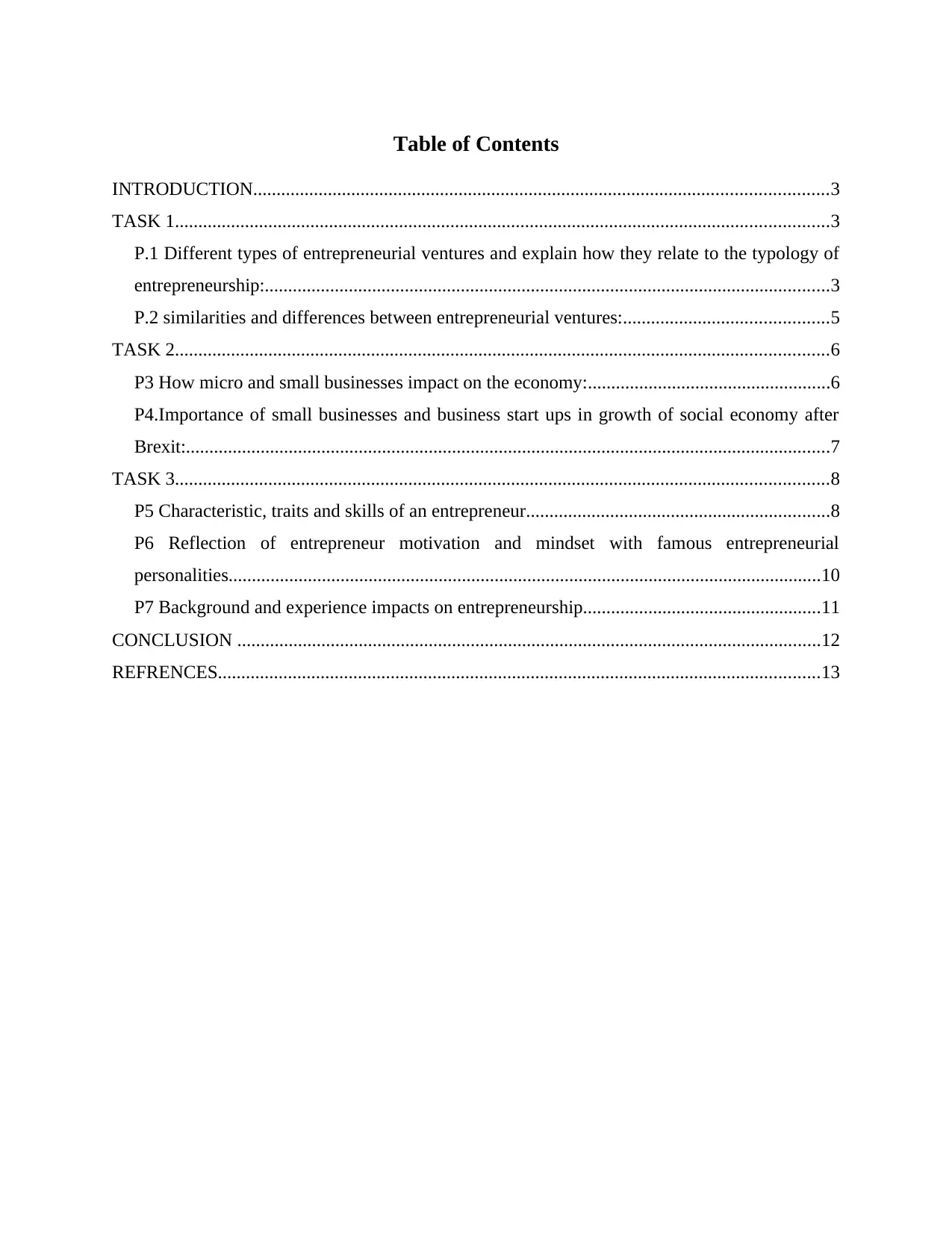
Table of Contents
INTRODUCTION...........................................................................................................................3
TASK 1............................................................................................................................................3
P.1 Different types of entrepreneurial ventures and explain how they relate to the typology of
entrepreneurship:.........................................................................................................................3
P.2 similarities and differences between entrepreneurial ventures:............................................5
TASK 2............................................................................................................................................6
P3 How micro and small businesses impact on the economy:....................................................6
P4.Importance of small businesses and business start ups in growth of social economy after
Brexit:..........................................................................................................................................7
TASK 3............................................................................................................................................8
P5 Characteristic, traits and skills of an entrepreneur.................................................................8
P6 Reflection of entrepreneur motivation and mindset with famous entrepreneurial
personalities...............................................................................................................................10
P7 Background and experience impacts on entrepreneurship...................................................11
CONCLUSION .............................................................................................................................12
REFRENCES.................................................................................................................................13
INTRODUCTION...........................................................................................................................3
TASK 1............................................................................................................................................3
P.1 Different types of entrepreneurial ventures and explain how they relate to the typology of
entrepreneurship:.........................................................................................................................3
P.2 similarities and differences between entrepreneurial ventures:............................................5
TASK 2............................................................................................................................................6
P3 How micro and small businesses impact on the economy:....................................................6
P4.Importance of small businesses and business start ups in growth of social economy after
Brexit:..........................................................................................................................................7
TASK 3............................................................................................................................................8
P5 Characteristic, traits and skills of an entrepreneur.................................................................8
P6 Reflection of entrepreneur motivation and mindset with famous entrepreneurial
personalities...............................................................................................................................10
P7 Background and experience impacts on entrepreneurship...................................................11
CONCLUSION .............................................................................................................................12
REFRENCES.................................................................................................................................13
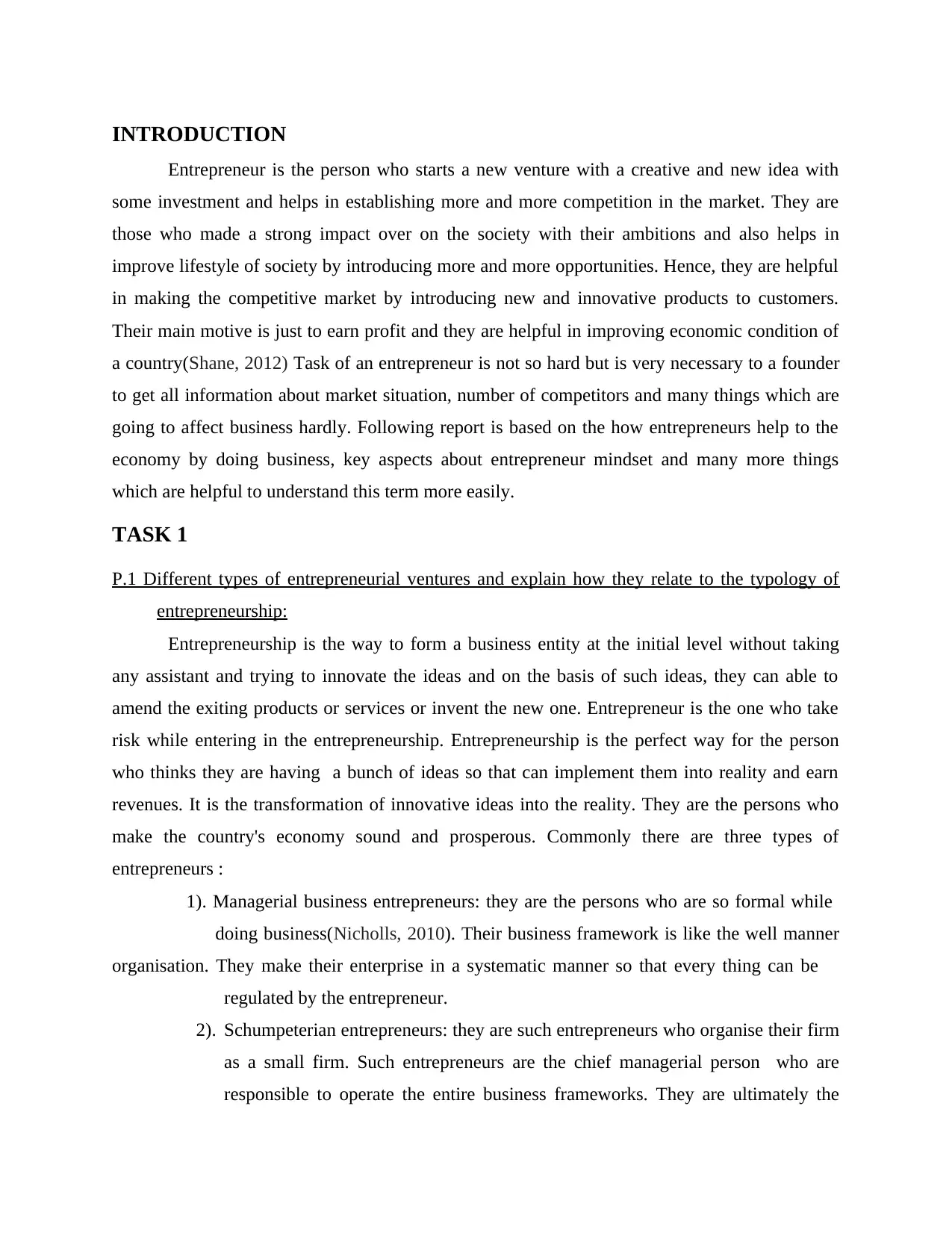
INTRODUCTION
Entrepreneur is the person who starts a new venture with a creative and new idea with
some investment and helps in establishing more and more competition in the market. They are
those who made a strong impact over on the society with their ambitions and also helps in
improve lifestyle of society by introducing more and more opportunities. Hence, they are helpful
in making the competitive market by introducing new and innovative products to customers.
Their main motive is just to earn profit and they are helpful in improving economic condition of
a country(Shane, 2012) Task of an entrepreneur is not so hard but is very necessary to a founder
to get all information about market situation, number of competitors and many things which are
going to affect business hardly. Following report is based on the how entrepreneurs help to the
economy by doing business, key aspects about entrepreneur mindset and many more things
which are helpful to understand this term more easily.
TASK 1
P.1 Different types of entrepreneurial ventures and explain how they relate to the typology of
entrepreneurship:
Entrepreneurship is the way to form a business entity at the initial level without taking
any assistant and trying to innovate the ideas and on the basis of such ideas, they can able to
amend the exiting products or services or invent the new one. Entrepreneur is the one who take
risk while entering in the entrepreneurship. Entrepreneurship is the perfect way for the person
who thinks they are having a bunch of ideas so that can implement them into reality and earn
revenues. It is the transformation of innovative ideas into the reality. They are the persons who
make the country's economy sound and prosperous. Commonly there are three types of
entrepreneurs :
1). Managerial business entrepreneurs: they are the persons who are so formal while
doing business(Nicholls, 2010). Their business framework is like the well manner
organisation. They make their enterprise in a systematic manner so that every thing can be
regulated by the entrepreneur.
2). Schumpeterian entrepreneurs: they are such entrepreneurs who organise their firm
as a small firm. Such entrepreneurs are the chief managerial person who are
responsible to operate the entire business frameworks. They are ultimately the
Entrepreneur is the person who starts a new venture with a creative and new idea with
some investment and helps in establishing more and more competition in the market. They are
those who made a strong impact over on the society with their ambitions and also helps in
improve lifestyle of society by introducing more and more opportunities. Hence, they are helpful
in making the competitive market by introducing new and innovative products to customers.
Their main motive is just to earn profit and they are helpful in improving economic condition of
a country(Shane, 2012) Task of an entrepreneur is not so hard but is very necessary to a founder
to get all information about market situation, number of competitors and many things which are
going to affect business hardly. Following report is based on the how entrepreneurs help to the
economy by doing business, key aspects about entrepreneur mindset and many more things
which are helpful to understand this term more easily.
TASK 1
P.1 Different types of entrepreneurial ventures and explain how they relate to the typology of
entrepreneurship:
Entrepreneurship is the way to form a business entity at the initial level without taking
any assistant and trying to innovate the ideas and on the basis of such ideas, they can able to
amend the exiting products or services or invent the new one. Entrepreneur is the one who take
risk while entering in the entrepreneurship. Entrepreneurship is the perfect way for the person
who thinks they are having a bunch of ideas so that can implement them into reality and earn
revenues. It is the transformation of innovative ideas into the reality. They are the persons who
make the country's economy sound and prosperous. Commonly there are three types of
entrepreneurs :
1). Managerial business entrepreneurs: they are the persons who are so formal while
doing business(Nicholls, 2010). Their business framework is like the well manner
organisation. They make their enterprise in a systematic manner so that every thing can be
regulated by the entrepreneur.
2). Schumpeterian entrepreneurs: they are such entrepreneurs who organise their firm
as a small firm. Such entrepreneurs are the chief managerial person who are
responsible to operate the entire business frameworks. They are ultimately the
⊘ This is a preview!⊘
Do you want full access?
Subscribe today to unlock all pages.

Trusted by 1+ million students worldwide
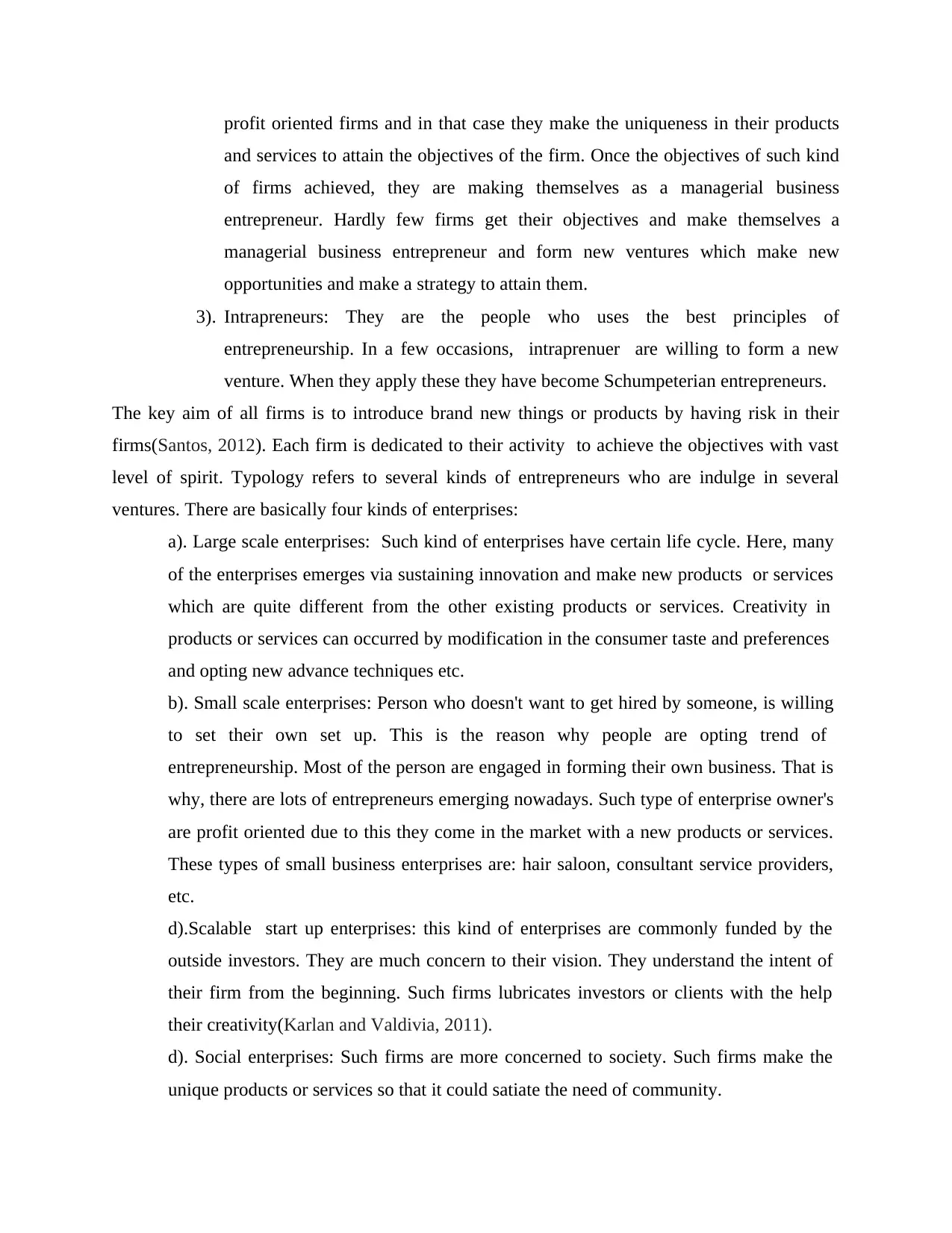
profit oriented firms and in that case they make the uniqueness in their products
and services to attain the objectives of the firm. Once the objectives of such kind
of firms achieved, they are making themselves as a managerial business
entrepreneur. Hardly few firms get their objectives and make themselves a
managerial business entrepreneur and form new ventures which make new
opportunities and make a strategy to attain them.
3). Intrapreneurs: They are the people who uses the best principles of
entrepreneurship. In a few occasions, intraprenuer are willing to form a new
venture. When they apply these they have become Schumpeterian entrepreneurs.
The key aim of all firms is to introduce brand new things or products by having risk in their
firms(Santos, 2012). Each firm is dedicated to their activity to achieve the objectives with vast
level of spirit. Typology refers to several kinds of entrepreneurs who are indulge in several
ventures. There are basically four kinds of enterprises:
a). Large scale enterprises: Such kind of enterprises have certain life cycle. Here, many
of the enterprises emerges via sustaining innovation and make new products or services
which are quite different from the other existing products or services. Creativity in
products or services can occurred by modification in the consumer taste and preferences
and opting new advance techniques etc.
b). Small scale enterprises: Person who doesn't want to get hired by someone, is willing
to set their own set up. This is the reason why people are opting trend of
entrepreneurship. Most of the person are engaged in forming their own business. That is
why, there are lots of entrepreneurs emerging nowadays. Such type of enterprise owner's
are profit oriented due to this they come in the market with a new products or services.
These types of small business enterprises are: hair saloon, consultant service providers,
etc.
d).Scalable start up enterprises: this kind of enterprises are commonly funded by the
outside investors. They are much concern to their vision. They understand the intent of
their firm from the beginning. Such firms lubricates investors or clients with the help
their creativity(Karlan and Valdivia, 2011).
d). Social enterprises: Such firms are more concerned to society. Such firms make the
unique products or services so that it could satiate the need of community.
and services to attain the objectives of the firm. Once the objectives of such kind
of firms achieved, they are making themselves as a managerial business
entrepreneur. Hardly few firms get their objectives and make themselves a
managerial business entrepreneur and form new ventures which make new
opportunities and make a strategy to attain them.
3). Intrapreneurs: They are the people who uses the best principles of
entrepreneurship. In a few occasions, intraprenuer are willing to form a new
venture. When they apply these they have become Schumpeterian entrepreneurs.
The key aim of all firms is to introduce brand new things or products by having risk in their
firms(Santos, 2012). Each firm is dedicated to their activity to achieve the objectives with vast
level of spirit. Typology refers to several kinds of entrepreneurs who are indulge in several
ventures. There are basically four kinds of enterprises:
a). Large scale enterprises: Such kind of enterprises have certain life cycle. Here, many
of the enterprises emerges via sustaining innovation and make new products or services
which are quite different from the other existing products or services. Creativity in
products or services can occurred by modification in the consumer taste and preferences
and opting new advance techniques etc.
b). Small scale enterprises: Person who doesn't want to get hired by someone, is willing
to set their own set up. This is the reason why people are opting trend of
entrepreneurship. Most of the person are engaged in forming their own business. That is
why, there are lots of entrepreneurs emerging nowadays. Such type of enterprise owner's
are profit oriented due to this they come in the market with a new products or services.
These types of small business enterprises are: hair saloon, consultant service providers,
etc.
d).Scalable start up enterprises: this kind of enterprises are commonly funded by the
outside investors. They are much concern to their vision. They understand the intent of
their firm from the beginning. Such firms lubricates investors or clients with the help
their creativity(Karlan and Valdivia, 2011).
d). Social enterprises: Such firms are more concerned to society. Such firms make the
unique products or services so that it could satiate the need of community.
Paraphrase This Document
Need a fresh take? Get an instant paraphrase of this document with our AI Paraphraser
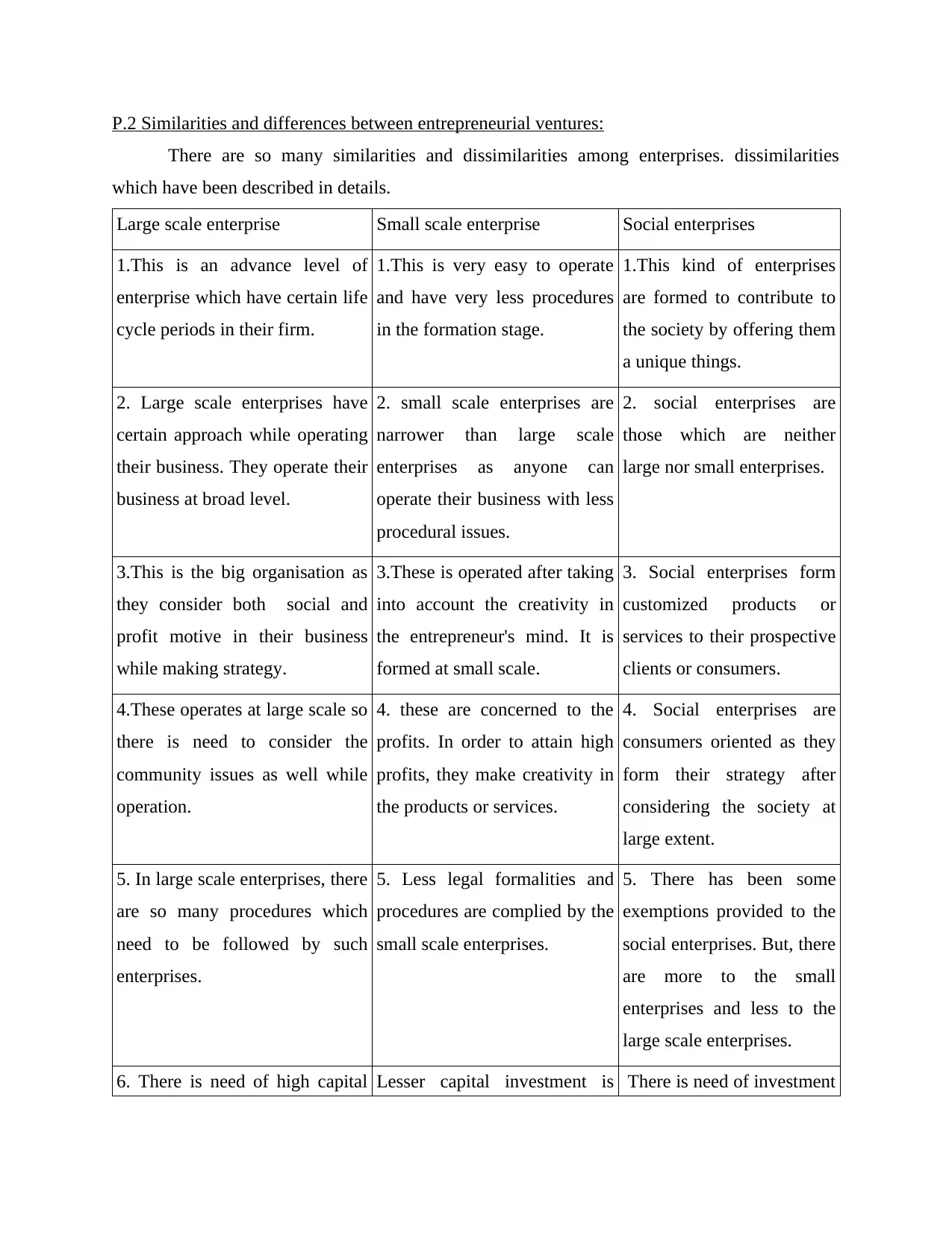
P.2 Similarities and differences between entrepreneurial ventures:
There are so many similarities and dissimilarities among enterprises. dissimilarities
which have been described in details.
Large scale enterprise Small scale enterprise Social enterprises
1.This is an advance level of
enterprise which have certain life
cycle periods in their firm.
1.This is very easy to operate
and have very less procedures
in the formation stage.
1.This kind of enterprises
are formed to contribute to
the society by offering them
a unique things.
2. Large scale enterprises have
certain approach while operating
their business. They operate their
business at broad level.
2. small scale enterprises are
narrower than large scale
enterprises as anyone can
operate their business with less
procedural issues.
2. social enterprises are
those which are neither
large nor small enterprises.
3.This is the big organisation as
they consider both social and
profit motive in their business
while making strategy.
3.These is operated after taking
into account the creativity in
the entrepreneur's mind. It is
formed at small scale.
3. Social enterprises form
customized products or
services to their prospective
clients or consumers.
4.These operates at large scale so
there is need to consider the
community issues as well while
operation.
4. these are concerned to the
profits. In order to attain high
profits, they make creativity in
the products or services.
4. Social enterprises are
consumers oriented as they
form their strategy after
considering the society at
large extent.
5. In large scale enterprises, there
are so many procedures which
need to be followed by such
enterprises.
5. Less legal formalities and
procedures are complied by the
small scale enterprises.
5. There has been some
exemptions provided to the
social enterprises. But, there
are more to the small
enterprises and less to the
large scale enterprises.
6. There is need of high capital Lesser capital investment is There is need of investment
There are so many similarities and dissimilarities among enterprises. dissimilarities
which have been described in details.
Large scale enterprise Small scale enterprise Social enterprises
1.This is an advance level of
enterprise which have certain life
cycle periods in their firm.
1.This is very easy to operate
and have very less procedures
in the formation stage.
1.This kind of enterprises
are formed to contribute to
the society by offering them
a unique things.
2. Large scale enterprises have
certain approach while operating
their business. They operate their
business at broad level.
2. small scale enterprises are
narrower than large scale
enterprises as anyone can
operate their business with less
procedural issues.
2. social enterprises are
those which are neither
large nor small enterprises.
3.This is the big organisation as
they consider both social and
profit motive in their business
while making strategy.
3.These is operated after taking
into account the creativity in
the entrepreneur's mind. It is
formed at small scale.
3. Social enterprises form
customized products or
services to their prospective
clients or consumers.
4.These operates at large scale so
there is need to consider the
community issues as well while
operation.
4. these are concerned to the
profits. In order to attain high
profits, they make creativity in
the products or services.
4. Social enterprises are
consumers oriented as they
form their strategy after
considering the society at
large extent.
5. In large scale enterprises, there
are so many procedures which
need to be followed by such
enterprises.
5. Less legal formalities and
procedures are complied by the
small scale enterprises.
5. There has been some
exemptions provided to the
social enterprises. But, there
are more to the small
enterprises and less to the
large scale enterprises.
6. There is need of high capital Lesser capital investment is There is need of investment
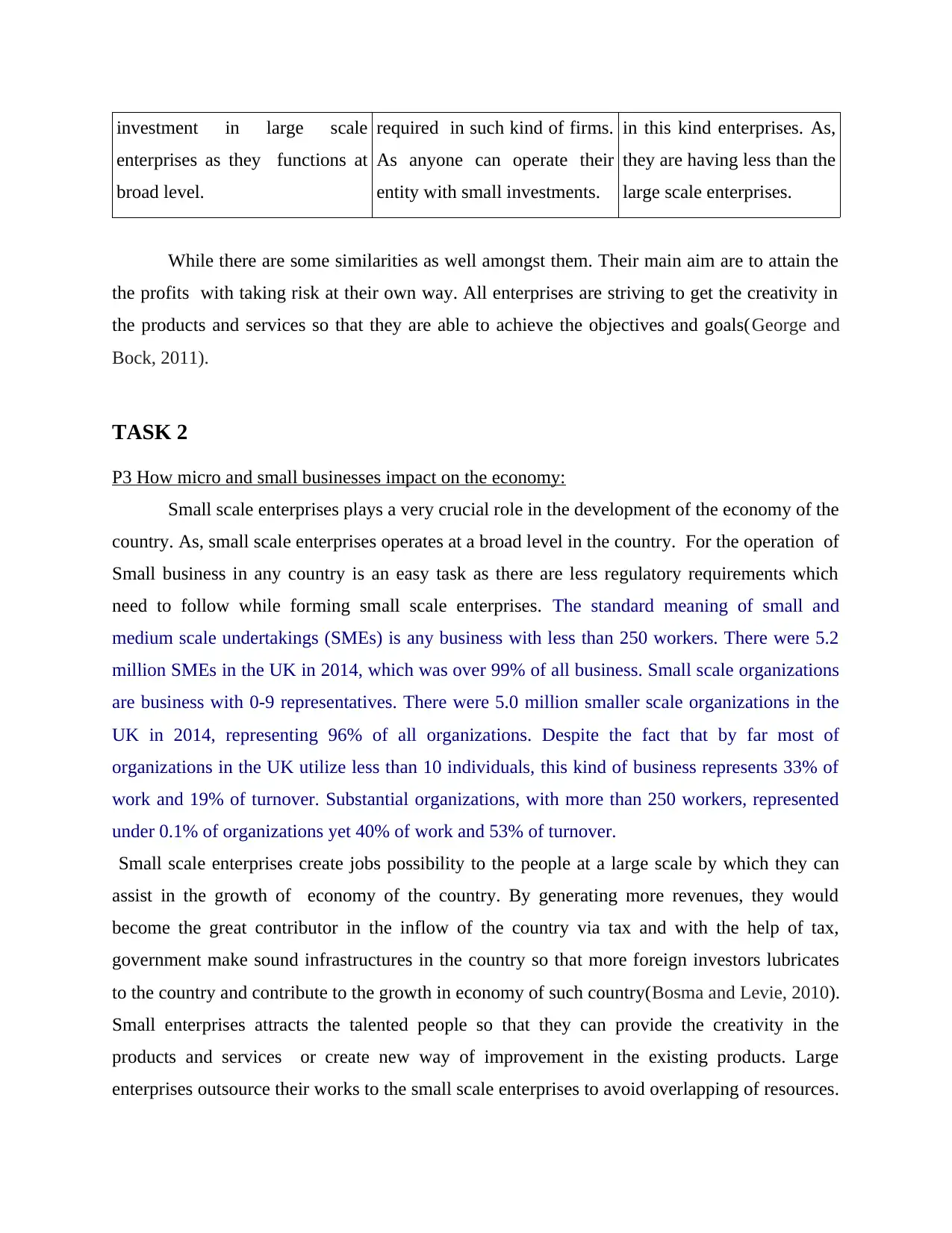
investment in large scale
enterprises as they functions at
broad level.
required in such kind of firms.
As anyone can operate their
entity with small investments.
in this kind enterprises. As,
they are having less than the
large scale enterprises.
While there are some similarities as well amongst them. Their main aim are to attain the
the profits with taking risk at their own way. All enterprises are striving to get the creativity in
the products and services so that they are able to achieve the objectives and goals(George and
Bock, 2011).
TASK 2
P3 How micro and small businesses impact on the economy:
Small scale enterprises plays a very crucial role in the development of the economy of the
country. As, small scale enterprises operates at a broad level in the country. For the operation of
Small business in any country is an easy task as there are less regulatory requirements which
need to follow while forming small scale enterprises. The standard meaning of small and
medium scale undertakings (SMEs) is any business with less than 250 workers. There were 5.2
million SMEs in the UK in 2014, which was over 99% of all business. Small scale organizations
are business with 0-9 representatives. There were 5.0 million smaller scale organizations in the
UK in 2014, representing 96% of all organizations. Despite the fact that by far most of
organizations in the UK utilize less than 10 individuals, this kind of business represents 33% of
work and 19% of turnover. Substantial organizations, with more than 250 workers, represented
under 0.1% of organizations yet 40% of work and 53% of turnover.
Small scale enterprises create jobs possibility to the people at a large scale by which they can
assist in the growth of economy of the country. By generating more revenues, they would
become the great contributor in the inflow of the country via tax and with the help of tax,
government make sound infrastructures in the country so that more foreign investors lubricates
to the country and contribute to the growth in economy of such country(Bosma and Levie, 2010).
Small enterprises attracts the talented people so that they can provide the creativity in the
products and services or create new way of improvement in the existing products. Large
enterprises outsource their works to the small scale enterprises to avoid overlapping of resources.
enterprises as they functions at
broad level.
required in such kind of firms.
As anyone can operate their
entity with small investments.
in this kind enterprises. As,
they are having less than the
large scale enterprises.
While there are some similarities as well amongst them. Their main aim are to attain the
the profits with taking risk at their own way. All enterprises are striving to get the creativity in
the products and services so that they are able to achieve the objectives and goals(George and
Bock, 2011).
TASK 2
P3 How micro and small businesses impact on the economy:
Small scale enterprises plays a very crucial role in the development of the economy of the
country. As, small scale enterprises operates at a broad level in the country. For the operation of
Small business in any country is an easy task as there are less regulatory requirements which
need to follow while forming small scale enterprises. The standard meaning of small and
medium scale undertakings (SMEs) is any business with less than 250 workers. There were 5.2
million SMEs in the UK in 2014, which was over 99% of all business. Small scale organizations
are business with 0-9 representatives. There were 5.0 million smaller scale organizations in the
UK in 2014, representing 96% of all organizations. Despite the fact that by far most of
organizations in the UK utilize less than 10 individuals, this kind of business represents 33% of
work and 19% of turnover. Substantial organizations, with more than 250 workers, represented
under 0.1% of organizations yet 40% of work and 53% of turnover.
Small scale enterprises create jobs possibility to the people at a large scale by which they can
assist in the growth of economy of the country. By generating more revenues, they would
become the great contributor in the inflow of the country via tax and with the help of tax,
government make sound infrastructures in the country so that more foreign investors lubricates
to the country and contribute to the growth in economy of such country(Bosma and Levie, 2010).
Small enterprises attracts the talented people so that they can provide the creativity in the
products and services or create new way of improvement in the existing products. Large
enterprises outsource their works to the small scale enterprises to avoid overlapping of resources.
⊘ This is a preview!⊘
Do you want full access?
Subscribe today to unlock all pages.

Trusted by 1+ million students worldwide
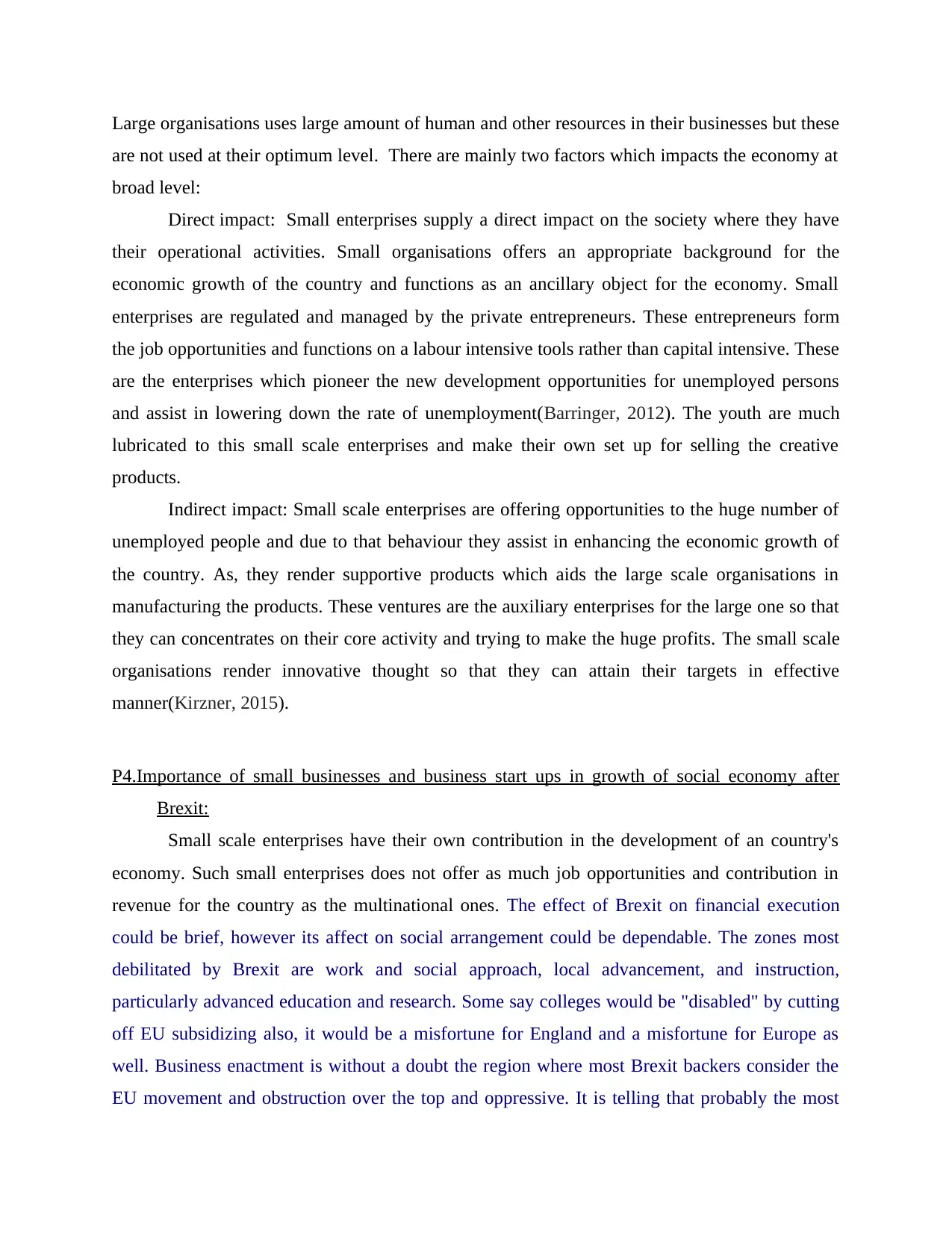
Large organisations uses large amount of human and other resources in their businesses but these
are not used at their optimum level. There are mainly two factors which impacts the economy at
broad level:
Direct impact: Small enterprises supply a direct impact on the society where they have
their operational activities. Small organisations offers an appropriate background for the
economic growth of the country and functions as an ancillary object for the economy. Small
enterprises are regulated and managed by the private entrepreneurs. These entrepreneurs form
the job opportunities and functions on a labour intensive tools rather than capital intensive. These
are the enterprises which pioneer the new development opportunities for unemployed persons
and assist in lowering down the rate of unemployment(Barringer, 2012). The youth are much
lubricated to this small scale enterprises and make their own set up for selling the creative
products.
Indirect impact: Small scale enterprises are offering opportunities to the huge number of
unemployed people and due to that behaviour they assist in enhancing the economic growth of
the country. As, they render supportive products which aids the large scale organisations in
manufacturing the products. These ventures are the auxiliary enterprises for the large one so that
they can concentrates on their core activity and trying to make the huge profits. The small scale
organisations render innovative thought so that they can attain their targets in effective
manner(Kirzner, 2015).
P4.Importance of small businesses and business start ups in growth of social economy after
Brexit:
Small scale enterprises have their own contribution in the development of an country's
economy. Such small enterprises does not offer as much job opportunities and contribution in
revenue for the country as the multinational ones. The effect of Brexit on financial execution
could be brief, however its affect on social arrangement could be dependable. The zones most
debilitated by Brexit are work and social approach, local advancement, and instruction,
particularly advanced education and research. Some say colleges would be "disabled" by cutting
off EU subsidizing also, it would be a misfortune for England and a misfortune for Europe as
well. Business enactment is without a doubt the region where most Brexit backers consider the
EU movement and obstruction over the top and oppressive. It is telling that probably the most
are not used at their optimum level. There are mainly two factors which impacts the economy at
broad level:
Direct impact: Small enterprises supply a direct impact on the society where they have
their operational activities. Small organisations offers an appropriate background for the
economic growth of the country and functions as an ancillary object for the economy. Small
enterprises are regulated and managed by the private entrepreneurs. These entrepreneurs form
the job opportunities and functions on a labour intensive tools rather than capital intensive. These
are the enterprises which pioneer the new development opportunities for unemployed persons
and assist in lowering down the rate of unemployment(Barringer, 2012). The youth are much
lubricated to this small scale enterprises and make their own set up for selling the creative
products.
Indirect impact: Small scale enterprises are offering opportunities to the huge number of
unemployed people and due to that behaviour they assist in enhancing the economic growth of
the country. As, they render supportive products which aids the large scale organisations in
manufacturing the products. These ventures are the auxiliary enterprises for the large one so that
they can concentrates on their core activity and trying to make the huge profits. The small scale
organisations render innovative thought so that they can attain their targets in effective
manner(Kirzner, 2015).
P4.Importance of small businesses and business start ups in growth of social economy after
Brexit:
Small scale enterprises have their own contribution in the development of an country's
economy. Such small enterprises does not offer as much job opportunities and contribution in
revenue for the country as the multinational ones. The effect of Brexit on financial execution
could be brief, however its affect on social arrangement could be dependable. The zones most
debilitated by Brexit are work and social approach, local advancement, and instruction,
particularly advanced education and research. Some say colleges would be "disabled" by cutting
off EU subsidizing also, it would be a misfortune for England and a misfortune for Europe as
well. Business enactment is without a doubt the region where most Brexit backers consider the
EU movement and obstruction over the top and oppressive. It is telling that probably the most
Paraphrase This Document
Need a fresh take? Get an instant paraphrase of this document with our AI Paraphraser
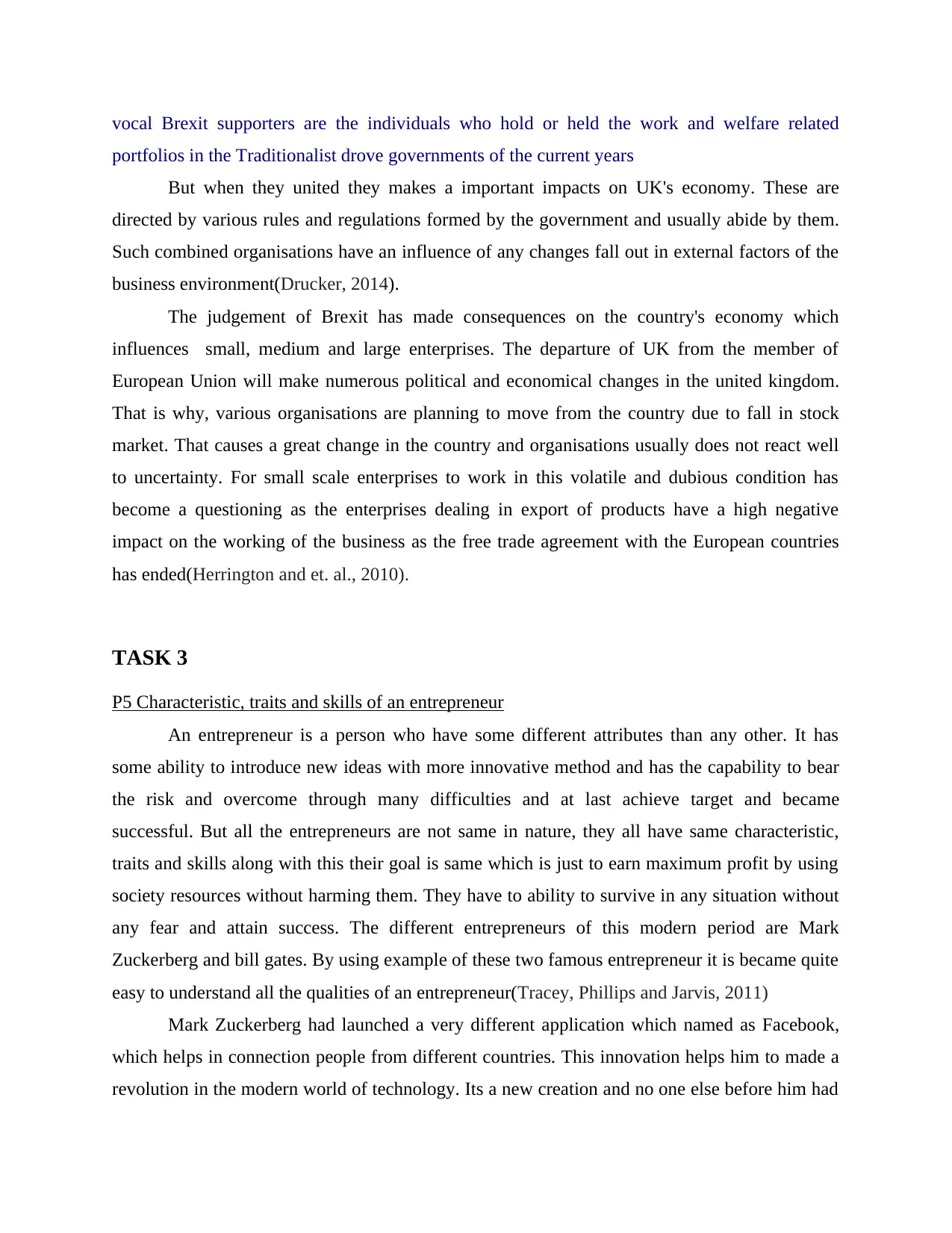
vocal Brexit supporters are the individuals who hold or held the work and welfare related
portfolios in the Traditionalist drove governments of the current years
But when they united they makes a important impacts on UK's economy. These are
directed by various rules and regulations formed by the government and usually abide by them.
Such combined organisations have an influence of any changes fall out in external factors of the
business environment(Drucker, 2014).
The judgement of Brexit has made consequences on the country's economy which
influences small, medium and large enterprises. The departure of UK from the member of
European Union will make numerous political and economical changes in the united kingdom.
That is why, various organisations are planning to move from the country due to fall in stock
market. That causes a great change in the country and organisations usually does not react well
to uncertainty. For small scale enterprises to work in this volatile and dubious condition has
become a questioning as the enterprises dealing in export of products have a high negative
impact on the working of the business as the free trade agreement with the European countries
has ended(Herrington and et. al., 2010).
TASK 3
P5 Characteristic, traits and skills of an entrepreneur
An entrepreneur is a person who have some different attributes than any other. It has
some ability to introduce new ideas with more innovative method and has the capability to bear
the risk and overcome through many difficulties and at last achieve target and became
successful. But all the entrepreneurs are not same in nature, they all have same characteristic,
traits and skills along with this their goal is same which is just to earn maximum profit by using
society resources without harming them. They have to ability to survive in any situation without
any fear and attain success. The different entrepreneurs of this modern period are Mark
Zuckerberg and bill gates. By using example of these two famous entrepreneur it is became quite
easy to understand all the qualities of an entrepreneur(Tracey, Phillips and Jarvis, 2011)
Mark Zuckerberg had launched a very different application which named as Facebook,
which helps in connection people from different countries. This innovation helps him to made a
revolution in the modern world of technology. Its a new creation and no one else before him had
portfolios in the Traditionalist drove governments of the current years
But when they united they makes a important impacts on UK's economy. These are
directed by various rules and regulations formed by the government and usually abide by them.
Such combined organisations have an influence of any changes fall out in external factors of the
business environment(Drucker, 2014).
The judgement of Brexit has made consequences on the country's economy which
influences small, medium and large enterprises. The departure of UK from the member of
European Union will make numerous political and economical changes in the united kingdom.
That is why, various organisations are planning to move from the country due to fall in stock
market. That causes a great change in the country and organisations usually does not react well
to uncertainty. For small scale enterprises to work in this volatile and dubious condition has
become a questioning as the enterprises dealing in export of products have a high negative
impact on the working of the business as the free trade agreement with the European countries
has ended(Herrington and et. al., 2010).
TASK 3
P5 Characteristic, traits and skills of an entrepreneur
An entrepreneur is a person who have some different attributes than any other. It has
some ability to introduce new ideas with more innovative method and has the capability to bear
the risk and overcome through many difficulties and at last achieve target and became
successful. But all the entrepreneurs are not same in nature, they all have same characteristic,
traits and skills along with this their goal is same which is just to earn maximum profit by using
society resources without harming them. They have to ability to survive in any situation without
any fear and attain success. The different entrepreneurs of this modern period are Mark
Zuckerberg and bill gates. By using example of these two famous entrepreneur it is became quite
easy to understand all the qualities of an entrepreneur(Tracey, Phillips and Jarvis, 2011)
Mark Zuckerberg had launched a very different application which named as Facebook,
which helps in connection people from different countries. This innovation helps him to made a
revolution in the modern world of technology. Its a new creation and no one else before him had
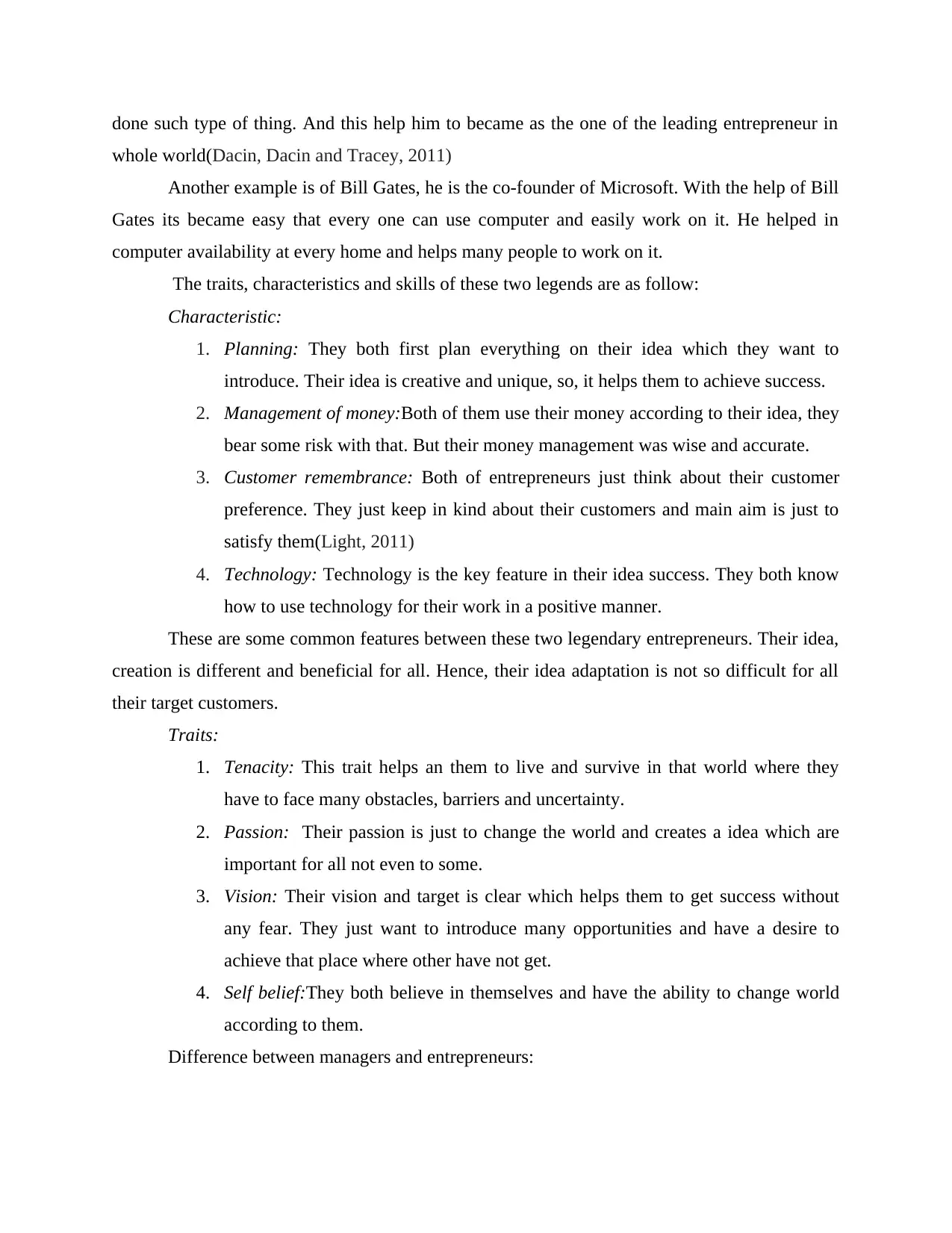
done such type of thing. And this help him to became as the one of the leading entrepreneur in
whole world(Dacin, Dacin and Tracey, 2011)
Another example is of Bill Gates, he is the co-founder of Microsoft. With the help of Bill
Gates its became easy that every one can use computer and easily work on it. He helped in
computer availability at every home and helps many people to work on it.
The traits, characteristics and skills of these two legends are as follow:
Characteristic:
1. Planning: They both first plan everything on their idea which they want to
introduce. Their idea is creative and unique, so, it helps them to achieve success.
2. Management of money:Both of them use their money according to their idea, they
bear some risk with that. But their money management was wise and accurate.
3. Customer remembrance: Both of entrepreneurs just think about their customer
preference. They just keep in kind about their customers and main aim is just to
satisfy them(Light, 2011)
4. Technology: Technology is the key feature in their idea success. They both know
how to use technology for their work in a positive manner.
These are some common features between these two legendary entrepreneurs. Their idea,
creation is different and beneficial for all. Hence, their idea adaptation is not so difficult for all
their target customers.
Traits:
1. Tenacity: This trait helps an them to live and survive in that world where they
have to face many obstacles, barriers and uncertainty.
2. Passion: Their passion is just to change the world and creates a idea which are
important for all not even to some.
3. Vision: Their vision and target is clear which helps them to get success without
any fear. They just want to introduce many opportunities and have a desire to
achieve that place where other have not get.
4. Self belief:They both believe in themselves and have the ability to change world
according to them.
Difference between managers and entrepreneurs:
whole world(Dacin, Dacin and Tracey, 2011)
Another example is of Bill Gates, he is the co-founder of Microsoft. With the help of Bill
Gates its became easy that every one can use computer and easily work on it. He helped in
computer availability at every home and helps many people to work on it.
The traits, characteristics and skills of these two legends are as follow:
Characteristic:
1. Planning: They both first plan everything on their idea which they want to
introduce. Their idea is creative and unique, so, it helps them to achieve success.
2. Management of money:Both of them use their money according to their idea, they
bear some risk with that. But their money management was wise and accurate.
3. Customer remembrance: Both of entrepreneurs just think about their customer
preference. They just keep in kind about their customers and main aim is just to
satisfy them(Light, 2011)
4. Technology: Technology is the key feature in their idea success. They both know
how to use technology for their work in a positive manner.
These are some common features between these two legendary entrepreneurs. Their idea,
creation is different and beneficial for all. Hence, their idea adaptation is not so difficult for all
their target customers.
Traits:
1. Tenacity: This trait helps an them to live and survive in that world where they
have to face many obstacles, barriers and uncertainty.
2. Passion: Their passion is just to change the world and creates a idea which are
important for all not even to some.
3. Vision: Their vision and target is clear which helps them to get success without
any fear. They just want to introduce many opportunities and have a desire to
achieve that place where other have not get.
4. Self belief:They both believe in themselves and have the ability to change world
according to them.
Difference between managers and entrepreneurs:
⊘ This is a preview!⊘
Do you want full access?
Subscribe today to unlock all pages.

Trusted by 1+ million students worldwide
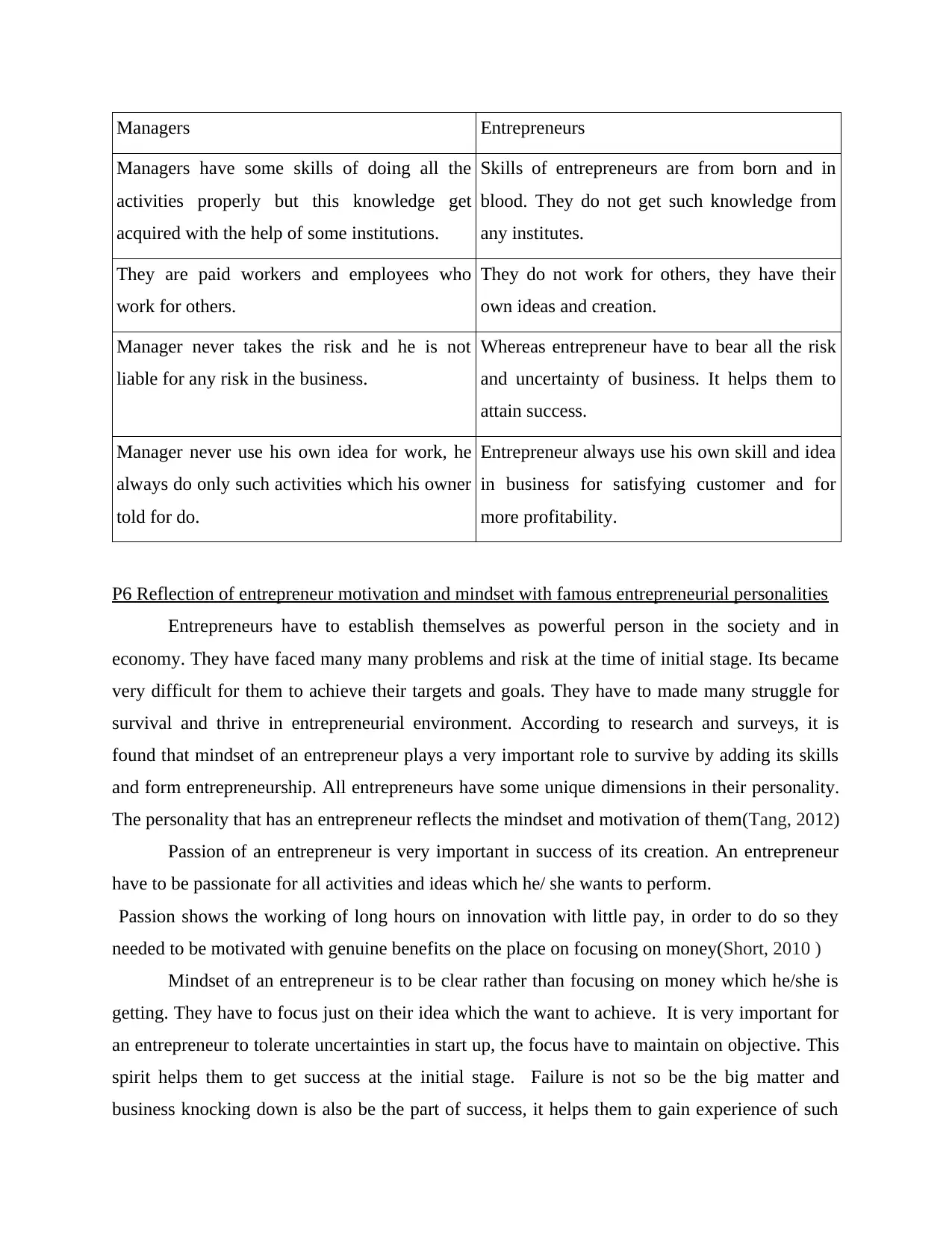
Managers Entrepreneurs
Managers have some skills of doing all the
activities properly but this knowledge get
acquired with the help of some institutions.
Skills of entrepreneurs are from born and in
blood. They do not get such knowledge from
any institutes.
They are paid workers and employees who
work for others.
They do not work for others, they have their
own ideas and creation.
Manager never takes the risk and he is not
liable for any risk in the business.
Whereas entrepreneur have to bear all the risk
and uncertainty of business. It helps them to
attain success.
Manager never use his own idea for work, he
always do only such activities which his owner
told for do.
Entrepreneur always use his own skill and idea
in business for satisfying customer and for
more profitability.
P6 Reflection of entrepreneur motivation and mindset with famous entrepreneurial personalities
Entrepreneurs have to establish themselves as powerful person in the society and in
economy. They have faced many many problems and risk at the time of initial stage. Its became
very difficult for them to achieve their targets and goals. They have to made many struggle for
survival and thrive in entrepreneurial environment. According to research and surveys, it is
found that mindset of an entrepreneur plays a very important role to survive by adding its skills
and form entrepreneurship. All entrepreneurs have some unique dimensions in their personality.
The personality that has an entrepreneur reflects the mindset and motivation of them(Tang, 2012)
Passion of an entrepreneur is very important in success of its creation. An entrepreneur
have to be passionate for all activities and ideas which he/ she wants to perform.
Passion shows the working of long hours on innovation with little pay, in order to do so they
needed to be motivated with genuine benefits on the place on focusing on money(Short, 2010 )
Mindset of an entrepreneur is to be clear rather than focusing on money which he/she is
getting. They have to focus just on their idea which the want to achieve. It is very important for
an entrepreneur to tolerate uncertainties in start up, the focus have to maintain on objective. This
spirit helps them to get success at the initial stage. Failure is not so be the big matter and
business knocking down is also be the part of success, it helps them to gain experience of such
Managers have some skills of doing all the
activities properly but this knowledge get
acquired with the help of some institutions.
Skills of entrepreneurs are from born and in
blood. They do not get such knowledge from
any institutes.
They are paid workers and employees who
work for others.
They do not work for others, they have their
own ideas and creation.
Manager never takes the risk and he is not
liable for any risk in the business.
Whereas entrepreneur have to bear all the risk
and uncertainty of business. It helps them to
attain success.
Manager never use his own idea for work, he
always do only such activities which his owner
told for do.
Entrepreneur always use his own skill and idea
in business for satisfying customer and for
more profitability.
P6 Reflection of entrepreneur motivation and mindset with famous entrepreneurial personalities
Entrepreneurs have to establish themselves as powerful person in the society and in
economy. They have faced many many problems and risk at the time of initial stage. Its became
very difficult for them to achieve their targets and goals. They have to made many struggle for
survival and thrive in entrepreneurial environment. According to research and surveys, it is
found that mindset of an entrepreneur plays a very important role to survive by adding its skills
and form entrepreneurship. All entrepreneurs have some unique dimensions in their personality.
The personality that has an entrepreneur reflects the mindset and motivation of them(Tang, 2012)
Passion of an entrepreneur is very important in success of its creation. An entrepreneur
have to be passionate for all activities and ideas which he/ she wants to perform.
Passion shows the working of long hours on innovation with little pay, in order to do so they
needed to be motivated with genuine benefits on the place on focusing on money(Short, 2010 )
Mindset of an entrepreneur is to be clear rather than focusing on money which he/she is
getting. They have to focus just on their idea which the want to achieve. It is very important for
an entrepreneur to tolerate uncertainties in start up, the focus have to maintain on objective. This
spirit helps them to get success at the initial stage. Failure is not so be the big matter and
business knocking down is also be the part of success, it helps them to gain experience of such
Paraphrase This Document
Need a fresh take? Get an instant paraphrase of this document with our AI Paraphraser
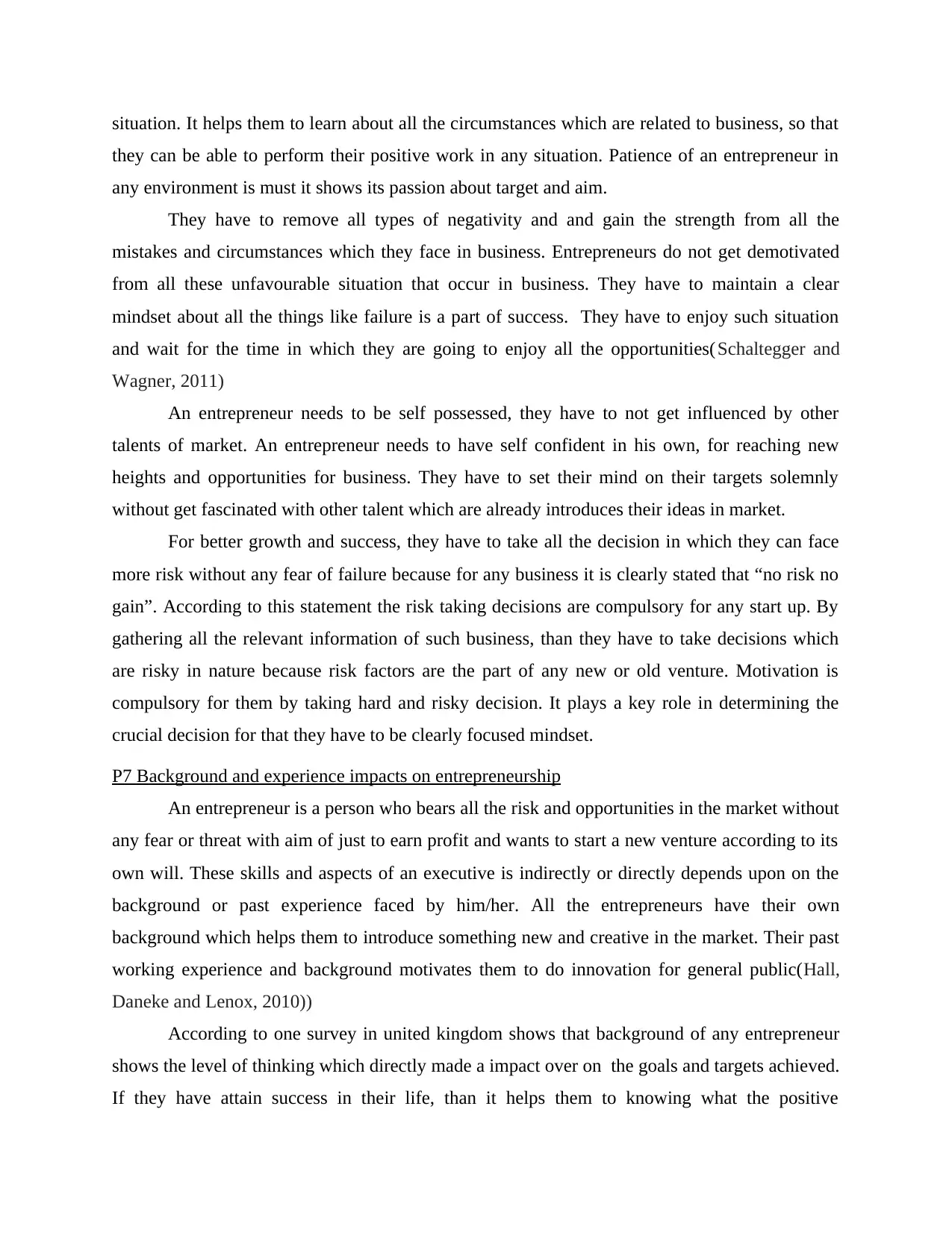
situation. It helps them to learn about all the circumstances which are related to business, so that
they can be able to perform their positive work in any situation. Patience of an entrepreneur in
any environment is must it shows its passion about target and aim.
They have to remove all types of negativity and and gain the strength from all the
mistakes and circumstances which they face in business. Entrepreneurs do not get demotivated
from all these unfavourable situation that occur in business. They have to maintain a clear
mindset about all the things like failure is a part of success. They have to enjoy such situation
and wait for the time in which they are going to enjoy all the opportunities(Schaltegger and
Wagner, 2011)
An entrepreneur needs to be self possessed, they have to not get influenced by other
talents of market. An entrepreneur needs to have self confident in his own, for reaching new
heights and opportunities for business. They have to set their mind on their targets solemnly
without get fascinated with other talent which are already introduces their ideas in market.
For better growth and success, they have to take all the decision in which they can face
more risk without any fear of failure because for any business it is clearly stated that “no risk no
gain”. According to this statement the risk taking decisions are compulsory for any start up. By
gathering all the relevant information of such business, than they have to take decisions which
are risky in nature because risk factors are the part of any new or old venture. Motivation is
compulsory for them by taking hard and risky decision. It plays a key role in determining the
crucial decision for that they have to be clearly focused mindset.
P7 Background and experience impacts on entrepreneurship
An entrepreneur is a person who bears all the risk and opportunities in the market without
any fear or threat with aim of just to earn profit and wants to start a new venture according to its
own will. These skills and aspects of an executive is indirectly or directly depends upon on the
background or past experience faced by him/her. All the entrepreneurs have their own
background which helps them to introduce something new and creative in the market. Their past
working experience and background motivates them to do innovation for general public(Hall,
Daneke and Lenox, 2010))
According to one survey in united kingdom shows that background of any entrepreneur
shows the level of thinking which directly made a impact over on the goals and targets achieved.
If they have attain success in their life, than it helps them to knowing what the positive
they can be able to perform their positive work in any situation. Patience of an entrepreneur in
any environment is must it shows its passion about target and aim.
They have to remove all types of negativity and and gain the strength from all the
mistakes and circumstances which they face in business. Entrepreneurs do not get demotivated
from all these unfavourable situation that occur in business. They have to maintain a clear
mindset about all the things like failure is a part of success. They have to enjoy such situation
and wait for the time in which they are going to enjoy all the opportunities(Schaltegger and
Wagner, 2011)
An entrepreneur needs to be self possessed, they have to not get influenced by other
talents of market. An entrepreneur needs to have self confident in his own, for reaching new
heights and opportunities for business. They have to set their mind on their targets solemnly
without get fascinated with other talent which are already introduces their ideas in market.
For better growth and success, they have to take all the decision in which they can face
more risk without any fear of failure because for any business it is clearly stated that “no risk no
gain”. According to this statement the risk taking decisions are compulsory for any start up. By
gathering all the relevant information of such business, than they have to take decisions which
are risky in nature because risk factors are the part of any new or old venture. Motivation is
compulsory for them by taking hard and risky decision. It plays a key role in determining the
crucial decision for that they have to be clearly focused mindset.
P7 Background and experience impacts on entrepreneurship
An entrepreneur is a person who bears all the risk and opportunities in the market without
any fear or threat with aim of just to earn profit and wants to start a new venture according to its
own will. These skills and aspects of an executive is indirectly or directly depends upon on the
background or past experience faced by him/her. All the entrepreneurs have their own
background which helps them to introduce something new and creative in the market. Their past
working experience and background motivates them to do innovation for general public(Hall,
Daneke and Lenox, 2010))
According to one survey in united kingdom shows that background of any entrepreneur
shows the level of thinking which directly made a impact over on the goals and targets achieved.
If they have attain success in their life, than it helps them to knowing what the positive
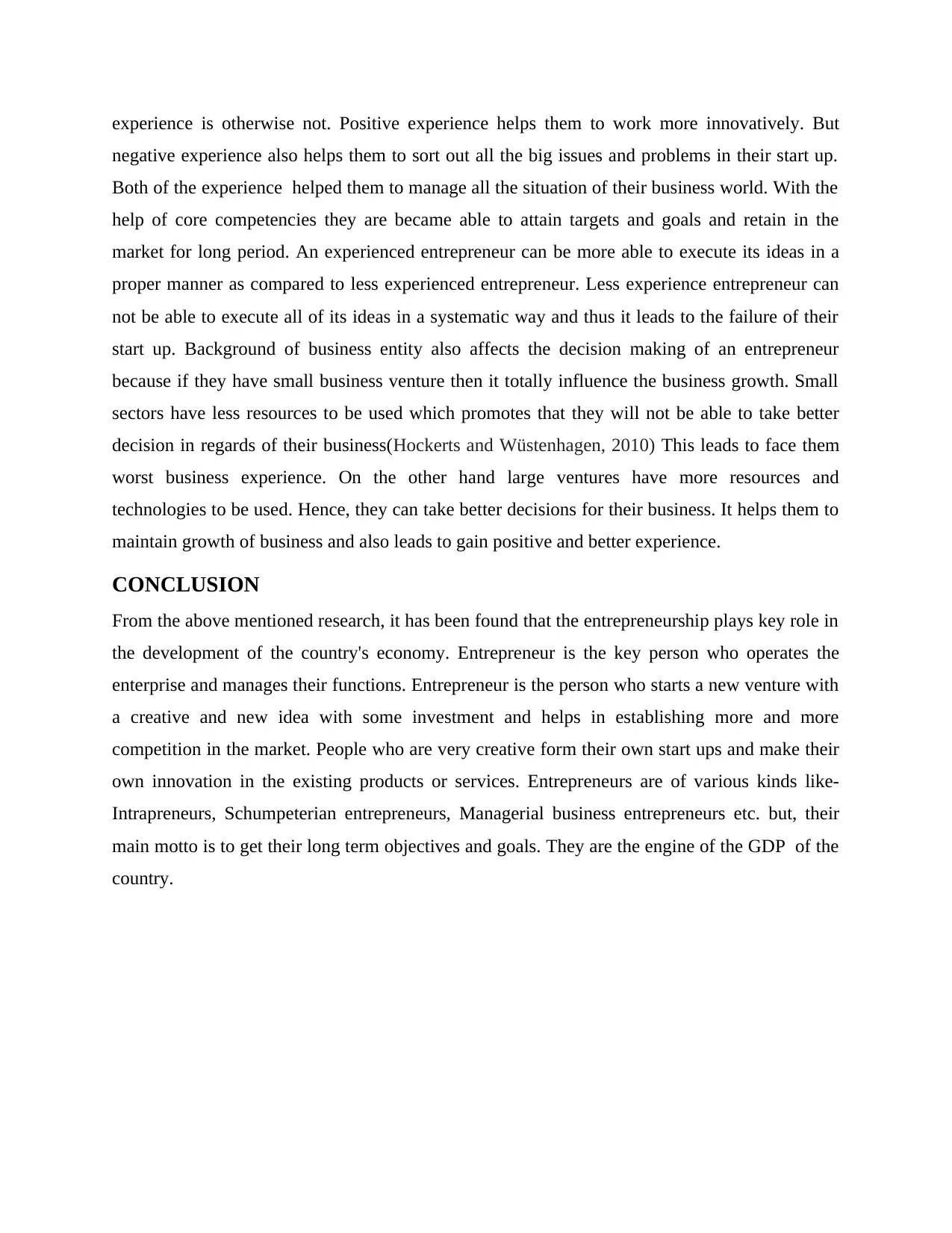
experience is otherwise not. Positive experience helps them to work more innovatively. But
negative experience also helps them to sort out all the big issues and problems in their start up.
Both of the experience helped them to manage all the situation of their business world. With the
help of core competencies they are became able to attain targets and goals and retain in the
market for long period. An experienced entrepreneur can be more able to execute its ideas in a
proper manner as compared to less experienced entrepreneur. Less experience entrepreneur can
not be able to execute all of its ideas in a systematic way and thus it leads to the failure of their
start up. Background of business entity also affects the decision making of an entrepreneur
because if they have small business venture then it totally influence the business growth. Small
sectors have less resources to be used which promotes that they will not be able to take better
decision in regards of their business(Hockerts and Wüstenhagen, 2010) This leads to face them
worst business experience. On the other hand large ventures have more resources and
technologies to be used. Hence, they can take better decisions for their business. It helps them to
maintain growth of business and also leads to gain positive and better experience.
CONCLUSION
From the above mentioned research, it has been found that the entrepreneurship plays key role in
the development of the country's economy. Entrepreneur is the key person who operates the
enterprise and manages their functions. Entrepreneur is the person who starts a new venture with
a creative and new idea with some investment and helps in establishing more and more
competition in the market. People who are very creative form their own start ups and make their
own innovation in the existing products or services. Entrepreneurs are of various kinds like-
Intrapreneurs, Schumpeterian entrepreneurs, Managerial business entrepreneurs etc. but, their
main motto is to get their long term objectives and goals. They are the engine of the GDP of the
country.
negative experience also helps them to sort out all the big issues and problems in their start up.
Both of the experience helped them to manage all the situation of their business world. With the
help of core competencies they are became able to attain targets and goals and retain in the
market for long period. An experienced entrepreneur can be more able to execute its ideas in a
proper manner as compared to less experienced entrepreneur. Less experience entrepreneur can
not be able to execute all of its ideas in a systematic way and thus it leads to the failure of their
start up. Background of business entity also affects the decision making of an entrepreneur
because if they have small business venture then it totally influence the business growth. Small
sectors have less resources to be used which promotes that they will not be able to take better
decision in regards of their business(Hockerts and Wüstenhagen, 2010) This leads to face them
worst business experience. On the other hand large ventures have more resources and
technologies to be used. Hence, they can take better decisions for their business. It helps them to
maintain growth of business and also leads to gain positive and better experience.
CONCLUSION
From the above mentioned research, it has been found that the entrepreneurship plays key role in
the development of the country's economy. Entrepreneur is the key person who operates the
enterprise and manages their functions. Entrepreneur is the person who starts a new venture with
a creative and new idea with some investment and helps in establishing more and more
competition in the market. People who are very creative form their own start ups and make their
own innovation in the existing products or services. Entrepreneurs are of various kinds like-
Intrapreneurs, Schumpeterian entrepreneurs, Managerial business entrepreneurs etc. but, their
main motto is to get their long term objectives and goals. They are the engine of the GDP of the
country.
⊘ This is a preview!⊘
Do you want full access?
Subscribe today to unlock all pages.

Trusted by 1+ million students worldwide
1 out of 15
Related Documents
Your All-in-One AI-Powered Toolkit for Academic Success.
+13062052269
info@desklib.com
Available 24*7 on WhatsApp / Email
![[object Object]](/_next/static/media/star-bottom.7253800d.svg)
Unlock your academic potential
Copyright © 2020–2026 A2Z Services. All Rights Reserved. Developed and managed by ZUCOL.





